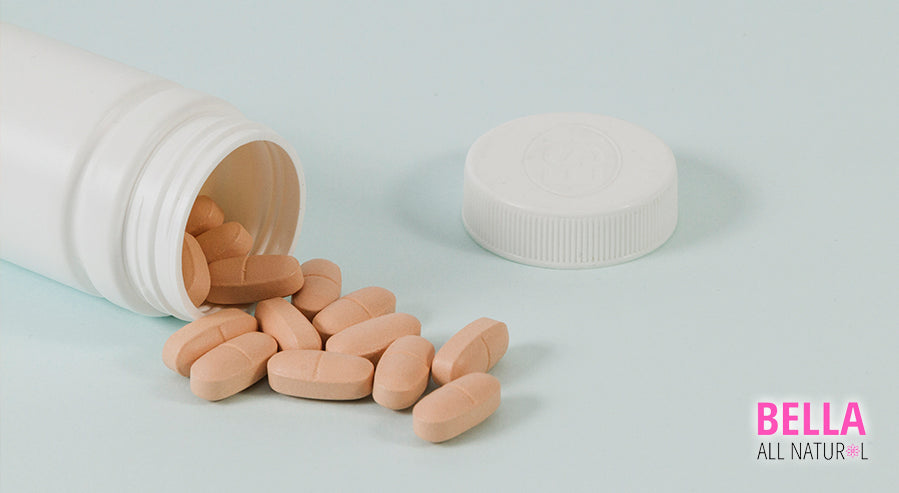

Have you ever wondered about the workings of CoQ10 supplements? To fully understand it, consider the complex functioning of a city, teeming with numerous simultaneous activities. This complexity is a reflection of your body's cells, where CoQ10 serves as the main energy source for cellular processes.
The significance of this minuscule molecule is immense. It is primarily crucial to our heart health and has a significant share in our bodies' energy production. Moreover, it may also contribute to managing certain disorders such as high blood pressure and migraine headaches.
Excited to know more? Here's where it gets more interesting. Beyond the above roles, CoQ10, while it could be overshadowed in the field of essential nutrients, may offer potentially transformative health benefits. We invite you to dig deeper into the compelling world of this often-underappreciated yet possibly life-altering nutrient.
An Introduction to CoQ10 Supplements
If you've been on the hunt for ways to support your heart health and boost cellular energy, chances are you've stumbled upon CoQ10 supplements. But what exactly are they? And more importantly, how do CoQ10 supplements work?
The term "CoQ10" is short for coenzyme Q-10. It's an essential nutrient naturally produced by our bodies and found in every cell. Our cells use it to generate energy - think of it as fuel that keeps us running.
Studies show most healthy individuals have sufficient levels of naturally produced CoQ10. However, its production may decrease with age or due to certain medical conditions.
CoQ10 is essential for producing ATP, the battery that energizes our cells. Aiding mitochondria – tiny power plants inside our cells – this coenzyme helps convert food into usable energy. Imagine having several mini power stations working around the clock to keep your body energized.
In addition, thanks to its antioxidant properties, it also fights off harmful free radicals, preventing oxidative damage within human tissues—kind of like internal housekeeping at the cellular level. More on that in a bit.

Beyond providing a vital cellular energy supply, one key benefit of this supplement lies in supporting cardiovascular health. Research indicates, though not conclusively so far, that regular intake might slightly lower blood pressure—a positive news for those looking out for natural remedies against heart disease.
Its antioxidative characteristics render it a crucial part of safeguarding our hearts from oxidative strain and inflammation, two important causes of cardiovascular illnesses. Think of CoQ10 as your heart's personal bodyguard.
So why is understanding CoQ10 supplements so crucial? Because they could potentially be more than just an energy booster or a protector for your heart.
Though no ultimate discoveries have been made yet, the possible advantages of CoQ10 in treating various ailments - from migraine headaches to low sperm count and gum disease to Parkinson's Disease - are still being studied.
The Effect of CoQ10 on Blood Pressure
CoQ10, commonly referred to as Coenzyme Q10, has been the subject of much interest due to its potential impact on blood pressure. This essential nutrient plays a pivotal role in our body's energy production and cellular function.
But how does it relate to lowering blood pressure? Let's dive into the heart of the matter.
Clinical studies have indicated that CoQ10 might be able to slightly reduce high blood pressure levels. It appears this benefit comes from its antioxidant properties, which combat oxidative stress - one key contributor to cardiovascular diseases like hypertension.
CoQ10 supplements may be able to reduce systolic blood pressure by up to 17 mm Hg and diastolic blood pressure by 10 mm Hg with few side effects, according to studies.

Oxidative stress refers to an imbalance between free radicals and antioxidants in your body. Free radicals are oxygen-containing molecules with an uneven number of electrons, allowing them to easily react with other molecules, causing large chain chemical reactions – or oxidation within your cells.
- Oxidation: A normal bodily process that can lead to harmful inflammation when out of control.
- Free Radicals: These unstable atoms can damage cells, causing illness and aging.
- Inflammation: Long-term inflammation is linked closely to several diseases, including heart disease.
Enter CoQ10. This natural antioxidant works to battle the free radicals in your body, diminishing oxidative strain. It's like having your very own microscopic superhero fighting off villainous molecules within you.
Note: Before beginning any supplement regimen, consulting a healthcare provider is advisable. It's recommended to consult your healthcare provider for the best-tailored advice regarding your health status and needs prior to beginning any new supplement program.
The Role of CoQ10 in Metabolism and Energy Production
As we mentioned, CoQ10 helps the body turn food into energy by facilitating ATP production through the mitochondrial respiratory chain, which can be prone to oxidative damage. This process involves the mitochondrial respiratory chain, where oxidative damage can occur from reactive oxygen species. Here's where CoQ10 shines. Its antioxidant properties protect cells from this oxidative stress.
If you've ever felt like you're running empty or just need a little boost to get through your day-to-day activities without feeling worn out – don't rush off to stock up on supplements yet.

You see, most healthy individuals have sufficient levels of naturally produced CoQ10 (source). Dietary sources such as oily fish are rich in this coenzyme, too. But there is no evidence that supports claims suggesting these supplements could enhance physical performance or give us that much-needed "energy" boost.
Apart from its role in metabolic processes and cell protection against free radicals – recent studies suggest potential health benefits associated with taking supplemental forms of CoQ10:
- CoQ10 may help slightly lower high blood pressure (source).
- CoQ10 supplements have been put to the test in some randomized controlled trials. The results? They're deemed safe, and CoQ10 seems to give relief to folks dealing with congestive heart failure.
Let's talk about some therapeutic applications next.
Potential Therapeutic Applications of CoQ10 Supplements
We're continually looking for more natural ways to maintain our health. Coenzyme Q10 has been gaining attention recently for its potential therapeutic uses. But why all the buzz? It turns out there are several potential therapeutic applications for this powerful compound.
CoQ10 has shown promise in treating migraine headaches. Some investigations point to the possibility that CoQ10 might help reduce migraine occurrences and severity by combating cell damage from oxidation.

The story doesn't end with migraines, though. Some research suggests that CoQ10 might even boost low sperm count, potentially offering a ray of hope for couples struggling with fertility issues.
In terms of chronic conditions like Parkinson's disease and muscular dystrophy, preliminary studies hint at the possible benefits of taking CoQ10 supplements. Though not definitive, these findings give reason to believe that further investigation could uncover exciting uses for this versatile nutrient in the fight against such debilitating diseases.
Fighting cancer requires every tool available - including perhaps Coenzyme Q10 supplements. They seem to enhance immune function while mitigating reactive oxygen species' harmful effects. These attributes could prove valuable as part of an integrated approach to tackling this devastating illness.
Surprisingly, even gum disease might be affected by CoQ10. As an antioxidant, it may help reduce inflammation and promote healing in the gums. While this is a new field of study for CoQ10, initial results look promising.
The impact of HIV on immune function can be devastating, but some evidence suggests that Coenzyme Q10 could play a part in boosting immunity among those living with HIV. Although research is ongoing, these findings represent another exciting avenue for potential applications of CoQ10 supplements.
Adverse Effects of Statin-Type Cholesterol Drugs Mitigated by CoQ10
Statins, or cholesterol-regulating drugs, are often prescribed to manage elevated low-density lipoprotein (LDL) cholesterol, which can contribute to heart disease. However, statin usage is frequently associated with side effects such as muscle pain and liver complications. Emerging research indicates that dietary supplementation with Coenzyme Q10 (CoQ10) could potentially alleviate these undesirable reactions.
LDL cholesterol levels are widely managed by statins to avert the risks related to heart disease. Concurrently, though, patients on this drug often report discomfort, including muscle pain and more severe conditions such as liver damage.
Coenzyme Q10, or CoQ10, a naturally occurring antioxidant in the body, may offer a solution. It has been identified as potentially beneficial in combating oxidative damage resulting from free radicals, a process which could help alleviate muscle pain and safeguard against other statin-related health issues.

One side effect of using statins to regulate cholesterol is that it unintentionally inhibits the body's natural production of CoQ10, presenting an energy paradox. Energy is just as crucial as controlled clinical trials exploring drug effects.
CoQ10 plays a vital role in supporting the mitochondria, our cellular energy factories, in producing adenosine triphosphate (ATP). ATP is essential for transferring energy within cells, effectively fuelling almost all metabolic activities.
Statins function by obstructing a substance required for cholesterol creation, inadvertently also blocking CoQ10 production. This has led scientists to hypothesize that CoQ10 supplementation may minimize statin-associated side effects, such as muscle pain and liver complications.
While there is some evidence suggesting the effectiveness of CoQ10 supplements for reducing statin-induced side effects, more expansive research is required to substantiate these findings conclusively. There have been several small-scale controlled trials that reported fewer statin-related adverse effects among participants supplementing their diet with CoQ10, as reported by the Mayo Clinic.
Exploring the Potential Role of CoQ10 in Alzheimer's Disease
Recent research is exploring an unexpected angle – the potential for CoQ10 supplements, celebrated for improving heart health and cellular energy, to also combat Alzheimer's disease.
This intriguing hypothesis is currently under intensive examination at the Mayo Clinic. The clinic's research suggests that CoQ10 could hinder the progression of neurological disorders such as Alzheimer's disease.
To conceptualize, picture the brain as a dynamic metropolis bustling with neurons. These neurons are continuously transmitting information through electrical impulses, akin to the citizens of a city. However, aging or disease can often disrupt this communication.

This is where CoQ10 comes into play. Much like an electrician who restores power to blacked-out neighborhoods, CoQ10 could help rejuvenate neurons by minimizing oxidative damage - a key cause of neuronal 'burnouts,' leading to cognitive deterioration.
In more technical terms, neurons are frequently under assault from reactive oxygen species – volatile molecules that induce inflammation and impair cells. Fortunately, antioxidants are nature's protectors against these detrimental threats.
Indeed, Coenzyme Q-10 (or CoQ10) operates as a biochemical shield against oxidative stress caused by these free radicals – the culprits responsible for much cellular disruption. By mitigating their impact, CoQ10 could potentially fortify our neuroprotective defenses.
However, how does this theoretical perspective correspond with actual scientific findings? A myriad of clinical trials have probed into the potential of CoQ10 in treating Alzheimer's disease.
A particular study found that early-stage Alzheimer's patients who ingested substantial amounts of CoQ10 for 16 months experienced improved cognitive function. Nonetheless, it must be emphasized that without further comprehensive studies on a larger scale, these findings remain preliminary.
Keep It All Natural!
CoQ10 is a vital element, proficiently powering your body's cells, similar to a well-oiled machine. Understanding how CoQ10 supplements lend their support to heart health and cellular energy is enlightening.
Impressive, isn't it? There's a possibility that it can reduce high blood pressure or alleviate migraine headaches. Its specific role in metabolism is yet to be conclusively defined, but it's essential to note that supplements don't necessarily benefit everyone.
Intrigued by CoQ10's diverse applications? It may potentially be beneficial for Parkinson's disease, muscular dystrophy, and even gum disease. Extended investigation, however, is necessary, so proceed with caution.
If you're experiencing muscle discomfort or liver issues due to statin cholesterol medications, CoQ10 could be a suitable aid. The potential to decelerate Alzheimer's progression is another possibility up for exploration!

Remember, CoQ10 is not the only supplement playing a crucial role in safeguarding the body against oxidative stress triggered by free radicals. It also has promising prospects in promoting heart health and exhibiting anti-inflammatory effects -Enter Moringa!
Here at Bella All Natural, our objective lies in providing natural supplements tailored to enhance health and aesthetics. Our range of products has been carefully created for a diverse array of benefits for your well-being, offering the optimal version of yourself without any medical intervention. Key players in our lineup include Moringa Juice and Moringa Capsules, providing a healthy balance of Moringa free from artificial additives.
We invite you to explore the merits of Moringa through our website and endeavor our products. Whatever your choice, we urge you to keep in mind – always stay All Natural!





